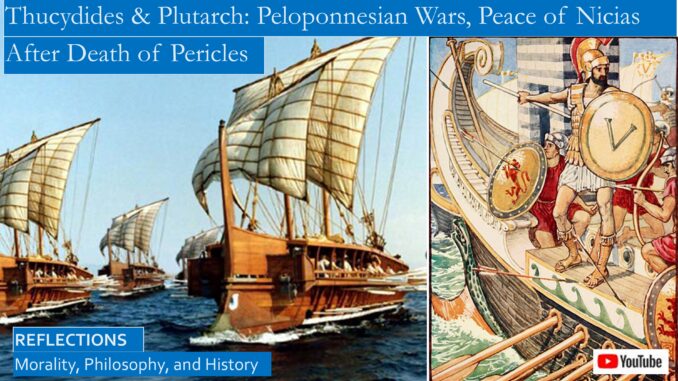
Thucydides admired the policies of Pericles. Pericles was indeed a formidable statesman, who was a skilled politician who sought to persuade his citizens to promote the interests of the state rather than seeking to always please the electorate with popular decisions. Pericles had the misfortune to die from the plague in the second year of the thirty-year Peloponnesian Wars, so we cannot say whether his reputation would have suffered had he fought the war for another decade or two. Like John F Kennedy, who was assassinated during his first term, the perceived wisdom of Pericles was enhanced by his early passing by plague in the second year of the war. Perhaps Thucydides would have been more critical of Pericles had he lived longer.
YouTube video for this blog: https://youtu.be/szi7-9QQWI0
YouTube script for more book links: https://www.slideshare.net/BruceStrom1/from-the-death-of-pericles-to-the-peace-of-nicias-peloponnesian-war-thucydides-and-plutarch
Link to view complete series of blogs on the Peloponnesian Wars:
https://seekingvirtueandwisdom.com/category/peloponnesian-wars/
Link to view complete series of videos on the Peloponnesian Wars:
https://www.youtube.com/watch?v=szi7-9QQWI0&list=PLJVlY2bjK8lg2pivnGN3m13VI8YstKs0T
As Professor Kenneth Harl points out, Pericles’ strategy of permitting the Spartans ravage the Athenian countryside while the Athenians boarded their ships and ravaged the countryside and food supply of the Peloponnese allies lead to a deadlock that could not be broken. Perhaps Pericles thought that after half a dozen years of such constant suffering the Spartans would simply sue for peace, but this would not happen as the citizens of both sides would deepen their anger for their enemies, guaranteeing that this war would indeed, as the Spartan King Archidamus warned, be a war that they would pass down to their children.[1]
After the death of Pericles, no popular leader arose that was able to dominate the Assembly like Pericles, which meant that it was impossible to follow a consistently stable wartime policy. Instead, Thucydides described a series of orators call demagogues. Pericles was the last Assembly orator who was also a general, he was elected to be a general for a dozen yearlong terms, in this war generals had to fight long campaigns and we unable to constantly address the Assembly, which led to the rise of the demagogue orators, who were often more interested in promoting polices that were popular with the people, and themselves, rather than promoting policies that would benefit the state.
We meet the first and most infamous demagogue, Cleon, during the last years of Pericles when many Athenians were dying from the plague behind the walls of Athens while the Spartan hoplites were ravaging their fields and their homes. We cannot improve on Will Durant’s choice of words, so we will quote him directly:
“The Athenians, desperate with the combined sufferings of epidemic and war, accused Pericles of responsibility for both. Cleon and others indicted him on the charge of misusing public funds; since he had apparently employed state money to bribe the Spartan kings to peace, he was unable to provide a satisfactory accounting; Pericles was convicted, deposed from office, and fined an enormous sum.”[2]
In our prior video, we discussed the memorable passages from Thucydides that describe how the Athenians suffered from the plague, and how the Athenians had a change of heart, rehabilitating Pericles to his former position of prominence, but as Pericles himself was suffering from the effects of the plague, he died soon thereafter. Will Durant said that “Pericles’ successors were too impatient to carry out a program that required a proud self-control. The new masters of the democracy were merchants like Cleon the leather dealer, Eucrates the rope seller, Hyperbolus the lamp maker; and these men demanded an active war on land and on sea. Cleon was the ablest of them, the most eloquent, unscrupulous, and corrupt.”[3]
This was truly a world war of the ancient world, and like World War I and World War II, there are many small and large battles in many theaters of war, we will look at only a few of these struggles in detail to learn how the first phase of the Peloponnesian Wars, the Archidamian War, was fought.
the Archidamian War, first phase of the Peloponnesian Wars
- Pericles strategy ensured deadlock, continuous war with no end in sight.
- As the Athenian and Spartan citizens suffered, their hatred for the other side grew, standing the way of a lasting armistice.
- After Pericles, no leader was able to dominate the Assembly, leading to the rise of demagogues, which made a consistent wartime policy impossible.
- Generals had to fight the war full-time without addressing the Assembly, which lead to the rise of the demagogue orators.
- Greek generals were in charge of both land and sea operations.
- Often allegiances were determined not by love or distaste for radical democracy, but local politics, where weaker states sought alliances to protect them against stronger neighbors.
- In ancient Greece, aristocrats could freely move between city-states even in the midst of war.
- City-state representatives were often permitted to address the assemblies of their enemies.
- In the ancient world, often when hostile city-states were utterly defeated, the men were slain, or sometimes condemned to be worked to death in the mines, and the women and children were enslaved.
- The Peloponnesian Wars sparked class tensions and revolutions in Corcyra and other city-states.
LEADERS AND GENERALS OF THE WAR
We have already met Cleon, the demagogue who was disdained by Thucydides because he was likely instrumental in his exile after his military misfortune in Amphipolis. Cleon’s counterpart was the Spartan general Brasidas, who led a daring campaign against the Athenian colonies on the East Coast of Greece.
Plutarch no doubt would have written a history of the life of the general Demosthenes, had he not been massacred in the Battle of Syracuse due to the bumbling of Nicias. He is not to be confused with the orator Demosthenes, who a century later warned of the dangers of tolerating the Macedonians under King Philip, father of Alexander the Great. Demosthenes was a brilliant general, always willing to try unorthodox strategies in addition to the set hoplite infantry battles, also using tactics of skirmishing and surprise attacks, often at night. Victories are victories, no matter how they are won.
In our next video we will see how the indecisiveness of Nicias in the Battle of Syracuse weakened the Athenian Empire, leading to its eventual defeat. But he will be somewhat of a hero in this video, as he negotiated the Peace of Nicias, which gave Athens a respite for half a dozen years from the annual invasions of the Spartans into Attica, razing their fields and their homes outside the walls.
Plutarch did write a biography for Nicias, the only biography of man famous for his ultimate failures rather than his earlier successes. You can argue that Nicias did not gain his immense wealth honestly, unless you can call working slaves to death in his silver mines honest, but it was not against the laws of the day, and he was not suspected of corruption in the offices he held. His greatest failing was not a moral failing, but rather fatal indecision, indecision which assisted in his early perceived successes and ultimate spectacular failure at the Battle of Syracuse, where hundreds of triremes were destroyed, and a large percentage of the male citizens of Athens were either slain or enslaved.
Plutarch is kinder towards Nicias than Thucydides, he quotes Aristotle as saying that Nicias was one of the “best citizens of Athens, demonstrating goodwill and affection of a father towards the general populace.” Many Athenians could see through “Cleon’s attempts to flatter them, sensing his self-seeking ambition, arrogance and effrontery, and they tended to back Nicias. The lofty manner of Nicias was blended with a certain caution, rather than being harsh or overbearing. His apparent fear of the people made him a popular leader.”
Nicias did not have the political acumen of Pericles, but he was enormously wealthy, so “he used his wealth to win the leadership of the people. Since he lacked the confidence to match Cleon’s tactic of using unscrupulous and flattering trickery to handle the Athenian people, he tried to win them over by paying for extravaganzas such as dramatic and athletic competitions, which he made more stylish, and on which he spent more money, than any of his predecessors and contemporaries.” “Nicias was surrounded by people asking for handouts.” “He gave money who could do him harm just as much as he did to people who deserved his benevolence, which meant that bad men made money from his timidity and good men from his generosity.”
Nicias’ timidity both ensured his early military successes as it doomed his largest expedition. Plutarch tells us, “Nicias tried to evade problematic or lengthy commands, and whenever he went on an expedition himself, he made safety his primary concern; consequently, he was usually successful.” Whenever he commanded a fleet that was sent as reinforcement, Nicias nearly always arrived after the battle was fought to congratulate the Athenian victors.[4]
PROGRESS OF THE WAR
There were many battles that we will mention only briefly that Thucydides discusses at length:
- The Athenians won the Battle of Potidaea, notable because in this battle Socrates saved the life of his student, Alcibiades.
- The Athenian general Demosthenes scores many military victories in northwest Greece, including battles at Corcyra,
- Athenian general Phormio established an Athenian naval base at Naupactus, controlling the Gulf of Corinth, also winning many victories in northwest Greece.
- The Corinthians were humiliated, and the Athenians controlled the western waters of Greece.
- Athens evacuated most of the citizens of Platea since it was indefensible. About five hundred men, and a hundred women who cooked, defended the city in a two-year siege, that was ultimately successful.
- The Athenians successfully campaigned in Sicily. Syracuse was a Spartan ally, so many smaller Sicilian cities allied with Athens. Sicily was a breadbasket for the Peloponnese.[5]
DEMOSTHENES ESTABLISHES AN ATHENIAN BASE AT PYLOS
One of the most remarkable stories of the war was how Demosthenes establishes an Athenian base at Pylos, scarcely forty-five miles from Sparta itself. When they heard news of the Revolution of Corcyra, the Athenian fleet were off the Laconian coast. Demosthenes wanted to first stop and establish a base at Pylos, at the southwest of the Peloponnese, the other generals objected, but as Thucydides tells us, “a storm brewed, and the ships were forced to land at Pylos. Demosthenes immediately proposed fortifying the place, since this was the reason why he joined the expedition. He pointed out there was plenty of timber and stone available, that it was in a naturally strong defensible position, and together with most of the surrounding country, was mostly uninhabited.” The other generals were opposed, but since the bad weather persisted, Demosthenes convinced the men to start building fortifications.
Why didn’t the Spartans immediately oppose them? Thucydides tells us, “the Spartans were celebrating a religious festival, and they did not take the news of the occupation of Pylos seriously, being sure that, once they marched against it, either the Athenians would withdraw, or else they would easily storm the position. The fact that their main army was still attacking Attica played a part in their holding back.”
Thucydides continues, “the Athenians spent six days fortifying the place on the side facing the land and in other necessary parts. They then left Demosthenes in charge with five ships as a garrison and hurried on their way to Corcyra and Sicily with the main body of their fleet. When the Peloponnesians in Attica heard of the capture of Pylos, they immediately withdrew and returned home,” after spending only fifteen days ravaging Attica.
Why did Demosthenes imagine that the heavily outnumbered Athenians defend the hastily constructed fortifications of Pylos, with only five triremes, so close to Sparta? Certainly, more triremes would be on their way, and the ancient sources do not mention this, but Demosthenes must have previously thoroughly scouted this area, studying the terrain and shorelines, pondering how best to defend a quickly assembled garrison. The Athenian camp at Pylos was located on a narrow peninsula, its geography was ideally suited for defense. This was one of the most amazing battles of the Peloponnesian Wars.
The Spartans planned their attack on the fortifications at Pylos. Since the only place to easily land ships was on the nearby island of Sphacteria, which also was uninhabited, heavily wooded, and one and a half miles long, they garrisoned the island with four hundred hoplites plus supporting helots. The Athenians only had only second-class arms they purchased from an arms merchant sailing by, in addition to their small number of fitted hoplite forces.
We read Thucydides as much for the speeches as we do the action, and he does not disappoint us when Demosthenes encourages his troops: “The odds are on our side, as long as we are determined to hold our ground and do not throw away our very real advantages through being frightened by our enemy’s numbers. One factor in our favor is that this is a difficult place for a ship landing, but this is an advantage to us only if we stand firm. Once we give way, the going, however difficult it is, will become easy for them, since there will be no one to resist them.” He concludes his speech with, “stand firm, meet the enemy right down on the water’s edge, and preserve this position and our own lives.”
The small contingent of Athenians did indeed stand firm against the Spartan attacks for two days. Thucydides tells us, “the Spartans could not force a landing because of the difficulty of the ground and because the Athenians stood firm and did not yield an inch. It was indeed a strange altercation for Athenians to be fighting a battle on land, Spartan land, against Spartans attacking from the sea, and for Spartans to be trying to make a naval landing on their own shores, now hostile to them, against Athenian opposition.”
Late on the second day fifty Athenian triremes appeared. The Athenian fleet engaged the Spartan triremes from both entrances into the bay, defeating them. Then the Spartans panicked when they realized their precious hoplite army was stranded on the island of Sphacteria. Thucydides describes this surprising change of events, “the Spartans decided to conclude an armistice at Pylos with the Athenian generals, if they would agree to it, and also to send ambassadors to Athens with a view to ending the war and so getting back their men as quickly as possible.”
The terms of the armistice were:
- The Spartans were permitted to send to their men a healthy daily ration of food and wine, under Athenian supervision.
- The Athenians would not land on the island, and attacks would cease.
- The Spartans surrendered their sixty ships until the peace was negotiated, Spartan ambassadors would sail to Athens on Athenian triremes to negotiate the peace.
Thucydides provides more moral lessons from the speeches of these Spartan ambassadors to the Athenian Assembly:
“Sparta calls upon you to make a treaty to end the war. She offers you peace, alliance, friendly and neighborly relations. In return she asks for the men on the island, since it is better for both sides that this war not proceed to the bitter end.” “In our view, where great hatreds exist, no lasting settlement can be made in a spirit of revenge, when one side gets the better of things in war and forces its opponent to swear to carry out the terms of an unequal treaty.” A treaty of the type that Thucydides warns against is the punitive Treaty of Versailles ending World War I, where the war guilt clause and punishing reparations help pave the way for the Nazis to spark World War II.
The Spartans continued, “As for Sparta and Athens, if ever there was a good time for making peace it is now, before some irremediable event overtakes us, something which would force us into an unending hatred of you, personal as well as political, and would deprive you of the hope of what we are offering you at this moment.”
The Athenians thought they had the upper hand; the Athenians were not ready for peace. Thucydides tells us, “the Athenians aimed at winning still more, and, as for making peace, they considered that while they had the men on the island they could do so whenever they liked. The man who, more than others, encouraged them in this attitude was Cleon,” the demagogue Thucydides hated so intensely.
Thucydides tells us, “At Pylos the war was waged vigorously by both sides.” More Athenian triremes arrived. The Spartans continued their attack on the palisades. Food was smuggled to the Spartan contingent on the island. But winter was approaching, there was only a small spring and brackish water on Pylos, the Athenians were restless, what to do?[6]
CLEON, WITH HELP FROM DEMOSTHENES, TRIUMPHANT AT SPHACTERIA
We will switch to Plutarch and his life of Nicias, since he has a more entertaining account of the upcoming battle, and Thucydides is only one of his sources. Plutarch accuses Cleon of having nefarious motives, when he states that “the Athenians regretted dismissing a Lacedaemonian delegation which had come to them to discuss a truce and terms for peace. They had rejected the offer as a result of Cleon’s opposition, and Cleon had opposed it mainly because of Nicias. Cleon was Nicias’ political enemy and when he saw how enthusiastic Nicias was in his dealings with the Lacedaemonians, he persuaded the Athenian people to vote against the truce. So, when the blockade at Pylos was starting to drag on, and they heard about the terrible difficulties their troops were operating, they were angry with Cleon.”
Plutarch continues, “Cleon tried to divert the blame on to Nicias. He accused him of being so timid and irresolute that he was letting the Spartans slip out of his grasp and claimed that, if he had been in command, they would not have slipped out of his grasp. At this point it occurred to the Athenians to say, ‘It’s not too late. Why don’t you take a fleet and get the men yourself?”
Another surprise: “Nicias then stood up and resigned his command of the expedition to Pylos in Cleon’s favor; he suggested that Cleon take as large a force as he liked, rather than boasting in mere words which involved no risk, actually achieve something significant for Athens.”
Cleon was merely making an argument, he did not expect the debate to proceed like this, he had never served as a general. “At first, in his confusion, he tried to draw back, but provoked by the Athenians’ insistence and Nicias’ taunts, he became fired by ambition: he accepted the command and also declared that within twenty days of setting sail he would either kill the Spartans there or bring them back alive to Athens. The Athenians were more likely to laugh long and loud at this then believe him, because they had learnt from other occasions to treat his capricious impetuosity as a rather good joke.”
Plutarch states that “Cleon was lucky, he did an excellent job as commander of the operation, along with Demosthenes, and within the specified time he brought back as prisoners of war the Spartans who had surrendered and survived the battle.” Professor Kenneth Harl says this was not luck, Cleon knew his limitations, and relied heavily on the advice of Demosthenes to achieve his objectives, he had already formulated a plan to achieve this objective.
Plutarch observes, “Nicias’ reputation suffered dreadfully as a result of Cleon’s success. For a soldier to abandon his shield is bad enough, but it seemed somehow worse, more disgraceful, for Nicias to have voluntarily resigned his command out of timidity, and to have handed over to his political enemy the opportunity to achieve such an important success by voting himself out of an office. Aristophanes mocks Nicias for this in the Birds:
Right, yes, it’s certainly time for us to stop,
Drowsing and procrastinating!”[7]
No doubt Nicias would have frittered away victory had he led the expedition, but by resigning he encourages the hubris and arrogance of Cleon, which would hurt future endeavors.
The battle continued at Pylos, there was deadlock, until the Messenians asked for light archers to accompany them to the Spartan rear through the rugged countryside, trapping the Spartans in a hopeless position. For the first time in memory a Spartan force surrendered, increasing the number of prisoners of war sent to Athens.[8]
CLEON AND BRASIDIS PERISH AT BATTLE OF AMPHIPOLIS
The Spartan commander Brasidas decided to counterpunch the Athenians by attacking their colonies and valuable possessions while the Athenians were ravaging the Peloponnese from Pylos. Brasidas marched to Thrace, avoiding conflicts with neutral powers who had not consented to passage of his armies, and later he captured Amphipolis, which controlled the valuable Athenian silver mines. Cleon was assigned an army, and marched to meet him, fancying that he was now an experienced general. His incompetence exposed the Athenian army to attack by Brasidas, and Cleon broke and ran, but did not outrun the soldier’s spear.[9]
Will Durant says that “Cleon redeemed himself by dying in battle against the Spartan hero Brasidas, who had been capturing one after another of the cities subject or allied to Athens in the mainland north.” “It was in this campaign that Thucydides lost his naval commission and his Athenian residence by coming up too tardily to the relief of Amphipolis, which commanded the gold mines of Thrace. Brasidas having died in the same campaign, Sparta, left leaderless in the face of a threatened Helot revolt, offered peace again; and Athens, for once taking the advice of the oligarchic leader, signed the Peace of Nicias.”[10]
Thucydides was given refuge by Sparta, and unlike Alcibiades after him, he did not turn traitor, but rather started gathering material for his History of the Peloponnesian War. Which reveals that, in ancient Greece, aristocrats could freely move between city-states even in the midst of war.
PEACE OF NICIAS
Plutarch praises Nicias for the peace, he says that as soon as “Nicias and Brasidas had both fallen at Amphipolis in a single battle, Nicias ascertained that the Spartans had desired peace for a long time, and that the Athenians were no longer so confident about their prospects in the war,” “so he set in motion actions designed to bring the two cities together in friendship, to free and relieve the rest of Greece from its troubles, and so to secure for the future his reputation for success.”
Plutarch continues, “The Spartans knew Nicias as a decent man, especially since he had shown concern for the welfare of the men who had been captured at Pylos and imprisoned at Athens, and had lightened their misfortune by treating them humanely, so they trusted him.” They established an armistice for a year, during with time there were visits by mutual guest-friends and low-level contacts. The Greeks “regarded the peace as the work of Nicias, just as they considered the war the work of Pericles. Pericles was held to involve the Greeks in calamitous disasters, for no very good reason, while the other managed to persuade them to forget all their terrible injuries and become friends. That is why even today this peace is called the ‘Peace of Nicias.’”
Plutarch continues, “Under the terms of the treaty, each side was to restore the land and communities they held which belonged to the other side, and also return their prisoners of war,” which the Spartans earnestly desired.
The allies of Sparta were not happy with the Peace of Nicias. When they threatened to rekindle the war, Plutarch tells us that “Nicias persuaded the Athenians and Lacedaemonians to supplement the peace treaty with their famous alliance, authoritatively bonding together the two states, to deter rebellions and encourage confidence in each other.”[11]
Thucydides adds that the treaty was for fifty years, though no Greek treaty lasted that long. The Spartans and Athenians could deal with their allies as they wished, but that Athens could not move against an ally that paid their tribute. All Greeks could sacrifice at the Panhellenic temples, and Delphi, where the famous oracle was located, was to be an independent state with its own law and judges.[12]
This was a fragile peace, threatened by both quarrelsome Spartan allies and by Athenian demagogues. This was as favorable a treaty as Athens and Sparta could hope for, but giving up Megara was hard for Athens, and nobody was satisfied with the treaty. The peace was challenged immediately, the chapters of each year of the peace in Thucydides have many incidents challenging the peace, and eventually the military ambitions of Alcibiades and Athens lead to foolish and costly decisions by all.
[1] Kenneth Harl, The Peloponnesian War, Teaching Company, 2007, Lecture 19.
[2] Will Durant, The Story of Civilization, Volume 2, Life of Greece (New York: Simon and Schuster, 1966, 1939), pp. 441-442.
[3] Will Durant, Life of Greece, p. 442.
[4] Plutarch, Greek Lives, Nicias, translated by Robin Waterfield (New York: Oxford University Press, 2008, 1998, originally 100+ AD), Chapters 2-6, pp. 185-189.
[5] Kenneth Harl, The Peloponnesian War, Teaching Company, 2007, Lectures 23-24.
[6] Thucydides, History of the Peloponnesian War, translated by Rex Warner (London, Penguin Classics, 1972, 1954, originally after 410 BC), Book 4.1-27, pp. 265-281.
[7] Plutarch, Greek Lives, Nicias, Chapters 7-8, pp.190-192
[8] Thucydides, History of the Peloponnesian War, Book 4.36-38, pp. 287-289.
[9] Thucydides, History of the Peloponnesian War, Book 4.74-78, pp. 309-312, Book 4.102-108, pp. 327-330, Book 5.6-11, pp. 351-355.
[10] Will Durant, The Story of Civilization, Volume 2, Life of Greece (New York: Simon and Schuster, 1966, 1939), p. 443.
[11] Plutarch, Greek Lives, Nicias, Chapters 9-10, pp. 192-194
[12] Thucydides, History of the Peloponnesian War, Book 5.18, pp. 359-360.

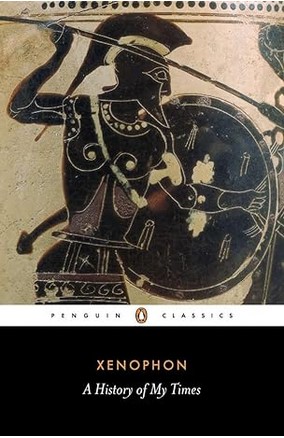
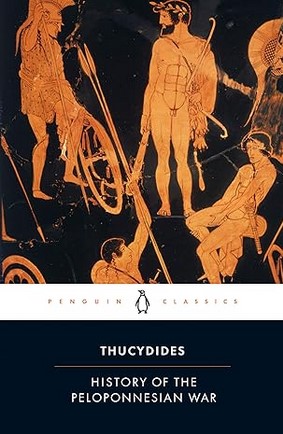
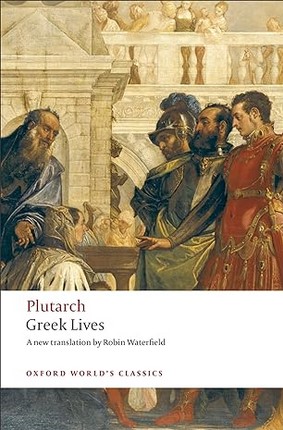
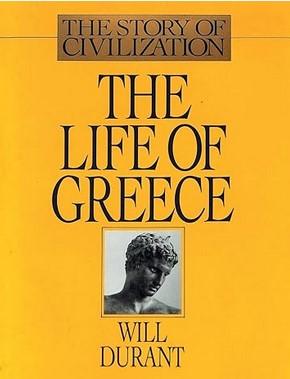


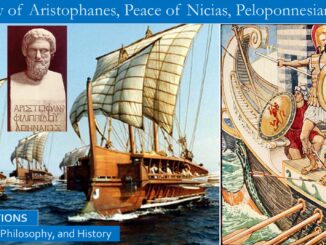
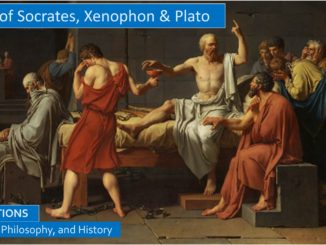
Be the first to comment